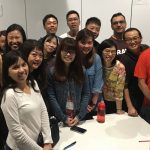More than six months ago I picked up “Reclaiming Conversation” by Sherry Turkle and devoured it over the Christmas break. Just a little later, through a random quote on Twitter I picked up “Linchpin” by Seth Godin on Kindle and got through that.
The random juxtaposition of these books provided some serious food for thought as to the evolving workplace, collaboration and where technology is taking us. Through the breadth of Turkle’s research it was not difficult to extend this to the family also, but I’ll stick with work, here for the taking.
Turkle puts forward a convincing, evidence based argument for a careful and prudent approach to communications technologies that are potentially causing a generational skills deficit – a whole generation who are less capable of empathy, collaboration and communication.
Godin, in a less rigorous “self-help” manner, describes a modern working world transformed by algorithms where the real value we add as humans is in “Emotional Labour” – that work which simply cannot be done by a computer.
Put these two arguments side by side and the realisation is stark – today’s mobile, connected, hyper-mediated world is splitting attention, replacing conversations with email threads and instant message feeds, it enables us to work simultaneously on the same thing from distant geographic locations. We are multitasking our multitasking. Turkle presents many examples of how this harms productivity and relationships.
At the same time, if you take Godin’s position – the workplace now requires us to invest more in relating, more in understanding, more in creating and collaborating than ever before. His argument is that this emotional labour, or “art”, is what stands the gretest chance of making you, as an employee, “indispensible”.
This is my point – at the same time as empathetic, human, emotional labour, is becoming the most valuable contribution we can make above that which will be in future done by algorithm – we are being disabled by technologies and communications platforms which dissolve and disable that very capability.
Because we “can” stretch ourselves, and work from anywhere, at any time, we do. It becomes “expected” of us. Why wouldn’t we be answering emails from an airport, or a meeting? Why not write a blog post while fielding expense approvals from the team? Why do we need a project space when “everything can be in Google Drive”? Why not work on five projects at the same time?
This is a toxic cultural shift and it needs addressing in every design-led context. Good content follows focus and collaboration, emerges from empathetic understanding, and is only possible in a safe and supportive culture. The very goal of doing something “new” requires a supportive environment, a safe place where the kinds of relationships developed are mutually beneficial and founded on trust. These are the kinds of relationships that require eye contact, conversation (not just about work!), shared spaces and, above all, time.
Networks are devouring our time and attention and “productivity” and “collaboration” platforms are making it easier to connect, but more difficult to engage. It’s more important than ever that organisations which intend to innovate understand and require the kinds of interactions that allow for the “emotional labour” required for real teamwork, real understanding and real creativity in a trusting environment.
Turkle’s research unearths several examples of companies testing new ways to combat the impact of networked tech on collaborative practices. Coping strategies for a new age. I won’t repeat those here. The ideal would be that design will one day acknowledge that there is a better brief beyond the design of attention seeking technologies, until we get there, it’s worth having this conversation.
Update (12/12/2016)… I snuck back to Dublin in November to talk about this topic having given it a little more thought. It’s a short presentation, less than 5 mins, and can be found below as part of the youtube playlist of many other great speakers from the night “DeFuse: Design for Use” , in Dublin.





Comments by John Lynch
Copenhagen to London
"Miguel - so happy you enjoyed the talk. While this post is..."